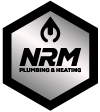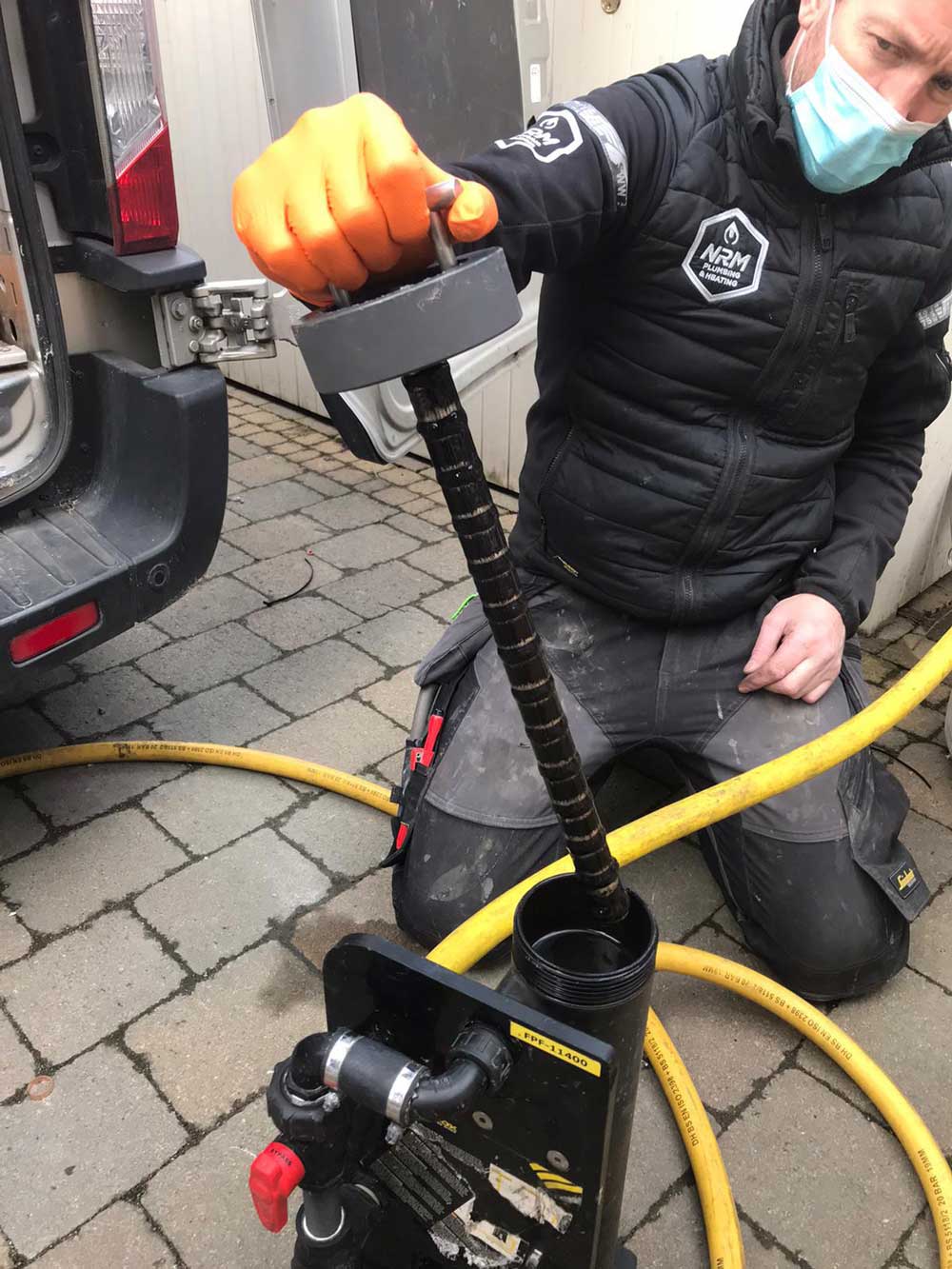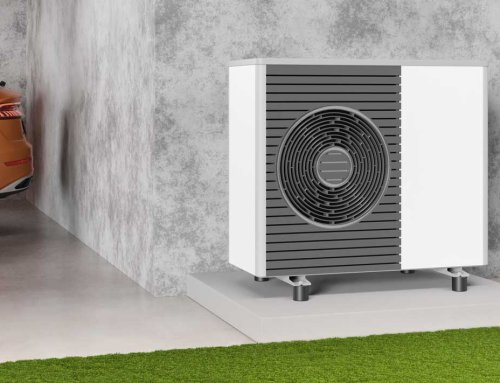Quick Navigation
- What is a Power Flush?
- What Can a Power Flush Do?
- The Benefits of a Power Flush
- How do blockages occur?
- When is a Power Flush Useful?
- How Do I Tell If My System Needs a Power Flush?
- Where Can I Get a Power Flush?
Maintaining the efficiency of your heating system is essential as it helps to save money in the long term. Flushing radiators is one way to maintain efficiency, but what exactly is a power flush, and how much does it cost?
Flushing Radiators – What is a Power Flush?
A power flush is a process in which water and chemicals are sent through your heating system’s pipes. It is a job that is best left to professionals such as NRM due to the use of chemicals and the plumbing knowledge that is required to execute a power flush successfully.
What Can a Power Flush Do?
Power flushing is not intended to fix every problem or issue you may experience with your heating, but it can treat one of the most common problems – blockages.
Flushing radiators makes them more efficient, as the flush will help remove any sediment or sludge that has collected over time. After flushing radiators, the water can flow more freely around your whole heating system.
If there is a complete blockage, the hot water won’t be able to get any further around the system. This means that any radiators in sequence after the blockage won’t get hot water in them, preventing areas and rooms in your home from being heated.
If it’s only a partial blockage, the water flow will be reduced, leading to ineffective heating. There won’t be a high enough volume of water reaching the radiators at the optimum temperature, meaning your boiler has to work harder for less benefit.
With either type of blockage, it’s possible that particles can process through the pipes and lodge in radiators or even the boiler. A radiator that is part-filled with unwanted limescale or other particles will not fully heat up, and getting such particles in the boiler itself can lead to an overall drop in efficiency – or even physical damage to the boiler.
Flushing radiators has several benefits, including removing these build-ups and maintaining or restoring the efficiency of your heating.
Flushing Radiators – The Benefits of a Power Flush
When there are no blockages in your heating system, it will run at its highest level of efficiency. This means that heating will be consistent throughout the system, and radiators will work precisely as expected.
You won’t suffer from cold areas, and your home will be warmed efficiently. This leads, in turn, to lower bills – your boiler won’t be working overtime to heat areas that are impossible to reach effectively, and your pump won’t be battling with restricted water flow.
With efficient operation throughout, the overall reliability of your heating system will be improved, and its lifespan extended. When the component parts work within their expected stress levels, they are less likely to break or suffer damage, which is good news for your boiler and radiators.
Flushing radiators can also make your heating quieter. Aside from being more efficient, the system will make less noise when there are no obstacles in the pipes. Power flushing has one further benefit, too – dirt and sludge can be removed from the pipes that feed the hot water to your bath or sink, meaning the overall quality of your water is improved too.
How do blockages occur?
One of the most common causes of blockages in central heating systems is the build-up of sediment and sludge – creating a physical barrier to the pipes. Sludge can form in numerous ways, but the most common are limescale and rust.
When part of the radiator or pipework develops rust, the flow of water will pick up particles as it goes by. The rust will naturally sink to the bottom of the pipe and gradually develop into a build-up of sludge.
The same can happen with limescale, which is typically caused by hard water. Limescale forms in a similar way to rust but then becomes flaky and evenly spread across the pipe’s surface.
Blockages are more likely to occur if you live in an old property or have a poorly maintained heating system that has not received regular flushing – the longer the pipes and radiators are left without flushing, the greater the chance of a significant build-up of sediment.
Flushing Radiators – When is a Power Flush Useful?
If you’ve noticed a degradation in the performance of your heating system, it is often beneficial to begin by flushing radiators to fix the problem. You won’t always be facing a problem that flushing radiators can improve, but the team at NRM plumbing heating and Gas Boiler replacement are happy to advise on how effective a flush is likely to be.
Power flushing is especially useful if your heating system has not been flushed for a while. If there are no blockages, it will simply remove the build-ups of sediment and sludge – improving water flow and efficiency as well as removing dirt from pipes to improve their condition.
If your radiators are only partially blocked, then flushing will restore their effectiveness by removing sediments that have built up in them but not yet reached an obstruction point.
Power flushing is a good idea if you’ve recently had maintenance carried out on your heating system – flushing will remove any dirt or sludge that has been left behind. Similarly, flushing radiators after installing new pipes can help to eliminate the risk of blockages in the future as flushing can remove the build-up of sludge that occurs naturally when new heating systems are installed, ensuring it runs as efficiently and reliably as possible from the start.
How Do I Tell If My System Needs a Power Flush?
If your heating system is noisy, you experience cold spots, you need to bleed the radiators constantly, or you are experiencing certain types of leaks, then a power flush might be helpful.
The easiest way is to contact NRM Power Flushing Dublin, and we will advise on the appropriate course of action.
Where Can I Get a Power Flush?
We offer a complete power flush service to help keep your heating working just how you want it. The cost of a power flush is dependent on the size of the heating system you have, as the more radiators that need flushing the higher the price.
For homes with six radiators or less, prices start at around €450 inc VAT*. Larger homes with up to 10 radiators start at €550 inc VAT* but don’t hesitate to get in touch with us for an accurate price for your home. (*All prices listed, are strictly subject to an on-site survey)
Remember, a power flush can keep your heating system in tip-top condition, reducing the need for repairs and replacements and lowering your energy bill – it makes sense to get your radiators flushed regularly.
NRM Plumbing Heating and Gas Boiler Replacement, 26 Glendoo Close, Walkinstown, Dublin 12. D12E7N9. Mobile: +353 87 990 89 13
Oil boilers are a great way to generate heat and hot water for your home, but they can also be a huge pain if you don’t maintain them properly. In our latest Blog Post, you will find seven tips on how oil boiler owners can maintain their system with an oil boiler service and regular maintenance.







